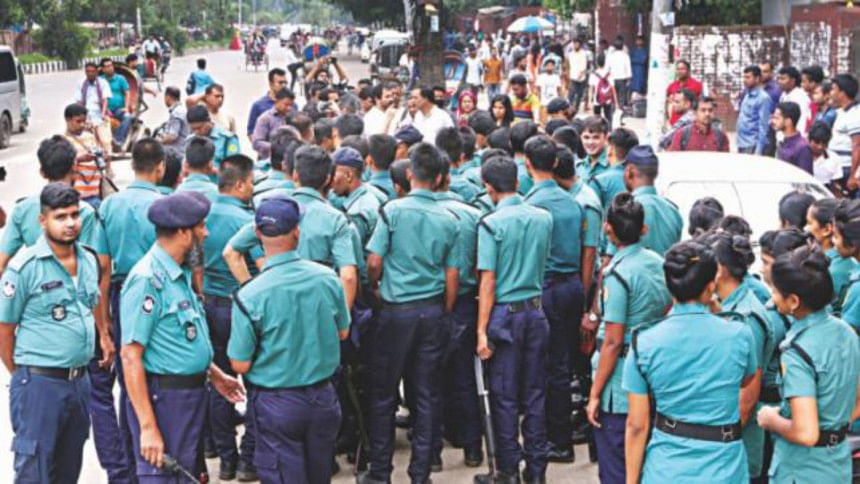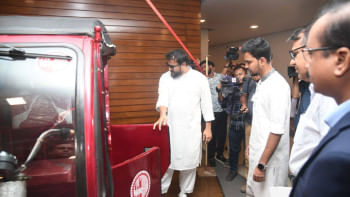Flashes of good governance

It is quite often that we are reminded of the pre-eminent virtues of good governance. Academics and practitioners of all categories have not missed any opportunity to apprise that all our efforts for socio-economic development will be set at naught if we cannot ensure good governance. As of now, experts are telling us that our ambitious and forward-looking budget will not bear the desired fruit if we cannot ensure propriety and discipline in the actual expenditure process.
The imperative of good governance applies in equal measure, if not more, to the regulatory organs of the state. In fact, where freedom and liberty are inextricably linked to the performance of a class of public servants, the necessity and urgency of good governance could hardly be overemphasised. In specific terms, this writer is pointing to the pressing need of ensuring good governance in the police organisation.
Good governance in police has multiple dimensions and for practical reasons it is not intended to dwell on various facets in this write-up. We may perhaps focus on the issue relating to recruitment in subordinate ranks of police organisation. In fact, the recruitment process deserves greater attention due to the simple reason that entry into law enforcement service cannot be done in an unlawful and unethical manner without serious detriment to the integrity of the criminal justice system.
Media reports on the unhealthy meddling in the recruitment process of the police, particularly in the subordinate ranks, are a sad reality. There is perhaps a lack of realisation that however good the organisational structures, the procedures and methods, it is the personnel who translate policy and strategy into action.
Unfortunately, we have not adequately appreciated that the nature of the police's role in a democracy requires that its members should be selected impartially—that they should be administratively competent, politically neutral, and imbued with the spirit of service. Police officers enjoy vast powers under the law and exercise wide discretion. Therefore, the recruitment process should be so devised that they are free from political, personal or corruptive influences.
It is in such a background that we may look at the laudable efforts of Bangladesh Police to ensure malpractice-free recruitment of nearly 10,000 constables in the recent past. Senior officials of the police hierarchy are confident that the overwhelming majority of these entrants have been appointed on the basis of merit without any influence-peddling. A good number of print and electronic media reports attest to that assertion.
This writer would like to mention, amongst others, the inspiring ventures of Jashore District Police that recruited nearly 200 personnel in an impartial and transparent manner. Recruitment test for the post of Trainee Recruit Constable (TRC) was held in Jashore from June 22 to June 27. A total number of 1,950 candidates appeared for the test in the Jashore Police Lines Field. After examination and scrutiny, a total number of 193 candidates were selected.
The distribution of the occupation of the guardians of the candidates selected was: 37 percent farmers (number of selected candidates was 72); 17 percent small businessmen (number of selected candidates was 32); 15 percent service (number of selected candidates was 29); 23 percent day labourers/richshaw-pullers/barbers (number of selected candidates was 43); eight percent guardians who died (number of selected candidates was 17).
It is interesting to note that one Shahab Ali, an appointee, son of a hairdresser in Jhikargacha Upazila, did not know that he would be a proud member of Bangladesh Police by dint of his merit and qualification. He, however, appeared at the selection field being motivated by the extensive publicity campaign by the Jashore District Police, regarding open, competitive and fair recruitment. Many other candidates like Shahab Ali have been selected for the post of police constable through a transparent manner on the strength of qualifications. As can be seen from the above distribution, many of these constables are wards of farmers, day labourers, rickshaw-pullers, hairdressers and other low-income groups.
The effort to recruit constables in an impartial and transparent manner assumes heightened significance because the large majority of our people have to interact with this rank in their daily course of business. Often, this is the first point of contact. The constables would not be sensitive and responsive to public woes if their entry is subject to a painful extortion process. Without doubt, such appointees will enter as bitter individuals who at the first available opportunity will recoup their investments by misusing coercive powers and discretions. The taxpaying citizens would suffer in the bargain. Surely, this is not desirable. The fair recruitment efforts of Bangladesh Police are a definitive step towards good governance and deserve to be recognised as such.
Muhammad Nurul Huda is a former IGP.

 For all latest news, follow The Daily Star's Google News channel.
For all latest news, follow The Daily Star's Google News channel. 



Comments